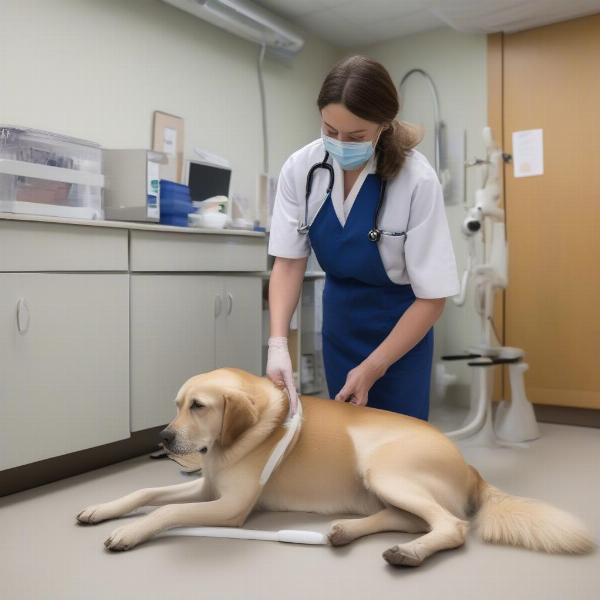Calcium is essential for dogs, contributing to strong bones, teeth, muscle function, and nerve transmission. While a balanced diet usually provides sufficient calcium, some dogs may require calcium supplements. Understanding when these supplements are necessary, how to choose the right one, and potential risks is crucial for responsible dog ownership. This guide will delve into the world of calcium supplements for dogs, offering practical advice and expert insights to help you ensure your canine companion’s well-being.
When Are Calcium Supplements Necessary?
While commercial dog food formulated for different life stages typically contains adequate calcium, certain situations may warrant supplementation. These include:
- Growth: Puppies, especially large breeds, have higher calcium demands for proper bone development. Inadequate calcium intake can lead to skeletal problems like rickets.
- Pregnancy and Lactation: Pregnant and nursing dogs require increased calcium to support fetal development and milk production. Calcium deficiency during this period can lead to eclampsia, a life-threatening condition.
- Medical Conditions: Certain medical conditions like hypocalcemia (low blood calcium), kidney disease, or certain medications can interfere with calcium absorption or utilization, necessitating supplementation.
- Home-Prepared Diets: If you feed your dog a home-prepared diet, it’s essential to work with a veterinary nutritionist to ensure it meets all their nutritional needs, including calcium. Supplementation may be necessary to balance the diet.
Choosing the Right Calcium Supplement for Your Dog
Not all calcium supplements are created equal. Factors to consider include:
- Form: Calcium supplements come in various forms, including tablets, chews, powders, and liquids. Choose a form that is palatable and easy to administer to your dog.
- Calcium Source: Look for supplements derived from natural sources like calcium carbonate, calcium citrate, or bone meal.
- Dosage: The correct dosage is crucial. Too much calcium can be harmful. Consult your veterinarian to determine the appropriate dosage for your dog’s age, breed, and health status.
- Other Ingredients: Some supplements contain additional nutrients like vitamin D, which aids in calcium absorption. Check the label to ensure the supplement doesn’t contain any ingredients that could be harmful to your dog.
Potential Risks of Calcium Supplementation
While calcium is essential, excessive intake can lead to health problems such as:
- Hypercalcemia: High blood calcium levels can cause symptoms like vomiting, constipation, increased thirst, and lethargy.
- Mineral Imbalances: Excess calcium can interfere with the absorption of other essential minerals like phosphorus and zinc.
- Kidney Stones: In some cases, excessive calcium intake can contribute to the formation of kidney stones.
“It’s crucial to remember that calcium supplementation should be done under veterinary guidance,” advises Dr. Emily Carter, DVM, a renowned veterinary nutritionist. “Over-supplementation can have serious health consequences.”
Signs of Calcium Deficiency in Dogs
Recognizing potential signs of calcium deficiency in your dog is essential for early intervention. These can include:
- Muscle tremors and weakness: Calcium plays a vital role in muscle function.
- Loss of appetite and weight loss: Nutritional deficiencies can manifest in changes in eating habits.
- Bone fractures and deformities: In growing puppies, calcium deficiency can lead to skeletal problems.
- Seizures: Severe calcium deficiency can result in neurological issues.
 Veterinarian Examining Dog for Calcium Deficiency
Veterinarian Examining Dog for Calcium Deficiency
Conclusion
Calcium is vital for your dog’s health, playing a key role in maintaining strong bones, teeth, and overall well-being. While calcium supplements can be beneficial in specific circumstances, it’s crucial to consult with your veterinarian before starting any supplementation. They can determine if your dog needs extra calcium and recommend the appropriate dosage and type of supplement. Remember, a balanced diet and regular veterinary check-ups are the cornerstones of ensuring your dog receives the necessary nutrients for a long, healthy life.
FAQ
- Do all dogs need calcium supplements? No, most dogs receiving a complete and balanced diet do not require supplements.
- Can I give my dog human calcium supplements? No, human calcium supplements may contain ingredients toxic to dogs and incorrect dosages.
- What are the best sources of calcium for dogs? Natural sources like bone meal, calcium carbonate, and calcium citrate are generally preferred.
- How can I tell if my dog is getting too much calcium? Signs of hypercalcemia include vomiting, constipation, increased thirst, and lethargy. Consult your veterinarian if you notice these symptoms.
- Can I give my dog calcium supplements without consulting a vet? It’s always best to consult your veterinarian before giving your dog any supplements, including calcium.
- Are there any natural ways to boost my dog’s calcium intake? Certain foods like yogurt (plain, unsweetened), sardines (with bones), and leafy green vegetables contain calcium but should be given in moderation.
- What should I do if I suspect my dog has a calcium deficiency? Contact your veterinarian immediately for diagnosis and treatment recommendations.
Related Articles
ILM Dog is your trusted resource for expert dog care advice and information. We offer a comprehensive range of resources covering breed selection, health and medical care, training and behavior, nutrition, grooming, and much more. Whether you’re a seasoned dog owner or just starting your journey, ILM Dog is here to support you every step of the way. For further assistance or personalized guidance, contact us at [email protected] or +44 20-3965-8624. Learn more about us at ILM Dog.